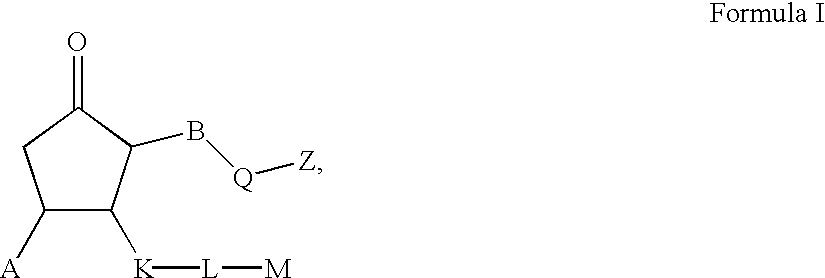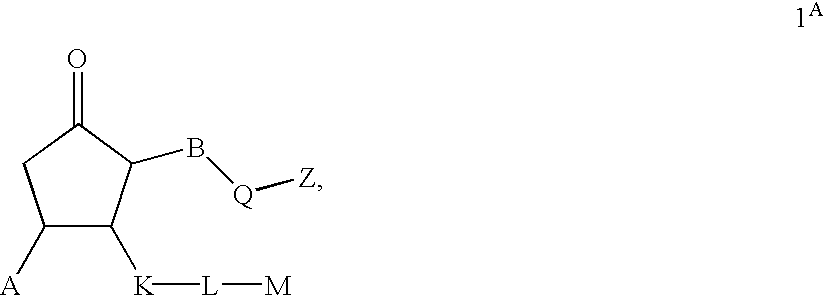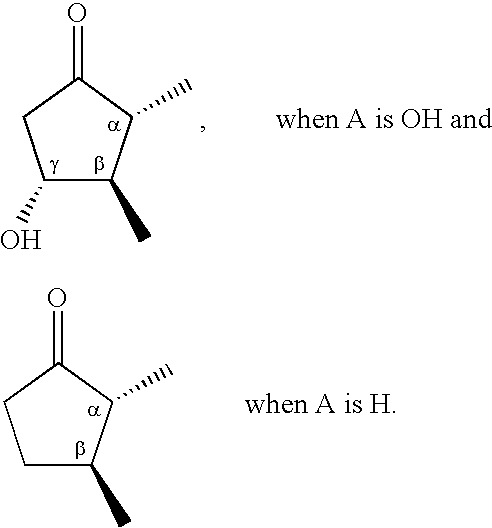Prostaglandin agonists
a technology of prostaglandin and agonist, applied in the field of prostaglandin agonist, can solve the problems of estrogen not restoring bone back to young adult levels in the established osteoporotic skeleton, the risk of osteoporosis is the greatest among the elderly, and the risk is predicted to increase significantly
- Summary
- Abstract
- Description
- Claims
- Application Information
AI Technical Summary
Problems solved by technology
Method used
Image
Examples
example 2
[0405] 16
trans-7-[2-Oxo-5-(3-oxo-3-phenyl-propyl)-cyclopentyl]-heptanoic acid
Step A
[0406] trans-7-[2-Oxo-5-(3-oxo-3-phenyl-propenyl)-cyclopentyl]-heptanoic acid methyl ester. To a solution of benzoyl chloride (0.224 mL, 1.94 mmol) in tetrahydrofuran (20 mL) was added tris(dibenzylideneacetone)dipa-lladium(0) (Pd.sub.2(DBA).sub.3) (8.8 mg, 0.01 mmol) and tri-2-furylphosphine (9.2 mg, 0.04 mmol). The mixture was stirred for 10 minutes and trans7-[2-oxo-5(2-tributylstannanyl-vinyl)-cyclopentyl]-hepta-noic acid methyl ester (the compound of Preparation 1, Step D, 1.0 g, 1.85 mmol) was added. The reaction was stirred for 24 h and was concentrated in vacuo. Radial chromatography (hexanes to 20% hexanes in ethyl acetate) provided the title compound of Step A as a clear and colorless oil (569 mg). .sup.1H NMR (CDCl.sub.3, 250 MHz) d 7.94 (m, 2H), 7.62-7.42 (m, 3H), 7.00 (m, 2H), 3.64 (s, 3H), 2.75 (m, 1H), 2.44 (m, 1H), 2.23 (m, 5H), 2.03 (m, 1H), 1.86-1.16 (m, 8H), 0.90 (t, 2H).
Step B
[0407...
example 3
[0409] 17
trans-7-{2-[3-(2,4-Dichloro-phenyl)-3-oxo-propenyl]-5-oxo-cyclopentyl}-hep-tanoic acid
Step A
[0410] Wang resin bound trans-7-{2-[(2,4-Dichloro-phenyl)-3-oxo-propenyl]--5-oxo-cyclopentyl}-heptanoic acid. Wang resin bound trans-7-[2-oxo-5-(2-tributyistannanyl-vinyl)-cyclopentyl]-heptanoic acid (the compound of Preparation 1, Step F, 70 mg, 0.525 mmol, 1 eq), tris(dibenzylideneacetone)dipalladium(0) (19.2 mg, 0.21 mmol, 0.4 eq) and potassium carbonate (80 mg, 0.577 mmol, 1.1 eq) were distributed in a 96well plate. To this was added tetrahydrofuran (0.6 mL), diisopropylethylamine (0.09 mL) and 2,4-dichloro-benzoyl chloride (117.6 mg, .about.8 eq). The resulting suspension was shaken overnight. The resin was filtered, washed, (N,N-dimethylformamide, methanol, dichloromethane, methanol, and diethyl ether) and oven dried.
Step B
[0411] trans-7-{2-[3-(2,4-Dichloro-phenyl)-3-oxo-propenyl]-5-oxo-cyclopent-yl}-heptanoic acid. Wang resin bound trans-7-{2-[3-(2,4-dichloro-phenyl)-3--oxo-pr...
example 66
[0413] 81
[0414] trans-7-{2-[2-(3-Cyano-phenyl)-vinyl]-5-oxo-cyclopentyl}-heptanoic acid. Wang resin bound trans-7-[2-oxo-5-(2-tributylstannanyl-vinyl)-cyclo-pentyl]-heptanoic acid (the compound of Preparation 1, Step F, 70 mg, 0.05 mmol, 1 eq), tris(benzylideneacetone)dipalladium(0) (18.2 mg, 0.02 mmol, 0.4 eq), diisopylethylamine (12.8 mg, 0.099 mmol, 2 eq), potassium carbonate (10 mg) and 3-bromo-benzonitrile (36.2 mg, 0.199 mmol, 4 eq) were placed in a well of a deep-well plate, and tetrahydrofuran was added until resin was just wet. The slurry was shaken at room temperature overnight. The resin was filtered and washed with N,N-dimethylformamide and methanol. It was repeatedly swollen with dichloromethane and shrunk with methanol. The resin was finally washed with diethyl ether to remove methanol. Cleavage of the product with trifluoroacetic acid as described in Step B of Example 3 with 90% trifluoroacetic acid in water gave the title compound of Example 66.
[0415] Examples 67-155...
PUM
| Property | Measurement | Unit |
|---|---|---|
| Volume | aaaaa | aaaaa |
| Volume | aaaaa | aaaaa |
| Volume | aaaaa | aaaaa |
Abstract
Description
Claims
Application Information
 Login to View More
Login to View More - R&D
- Intellectual Property
- Life Sciences
- Materials
- Tech Scout
- Unparalleled Data Quality
- Higher Quality Content
- 60% Fewer Hallucinations
Browse by: Latest US Patents, China's latest patents, Technical Efficacy Thesaurus, Application Domain, Technology Topic, Popular Technical Reports.
© 2025 PatSnap. All rights reserved.Legal|Privacy policy|Modern Slavery Act Transparency Statement|Sitemap|About US| Contact US: help@patsnap.com



